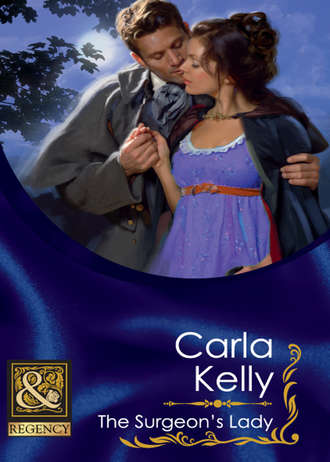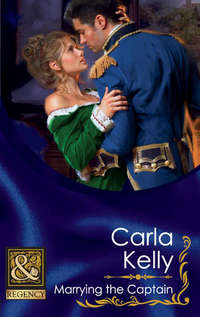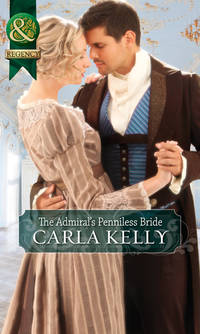
Полная версия
The Surgeon's Lady
“Yes,” Oliver said, sounding wary.
“He did a fine job. When it heals, you’ll look a little lopsided, but I promise you, you won’t frighten children. Not even your own.”
Captain Worthy gingerly touched what remained of his ear. “Just as long as I still terrify midshipmen.”
“You will, sir. Lady Taunton, observe how well it is granulating.” He pointed at the raw rim. “Barnhart threw some nice blanket stitches on the lobe, or what’s left of it.”
She looked closer, because he seemed to expect it. As she gazed at the injury to her brother-in-law’s ear, it suddenly occurred to her that a common surgeon with the preposterous name of Philemon Brittle was treating her as an equal. She thought how appalled Sir James Taunton would have been by her even being in the room, much less in Torquay visiting a sister as illegitimate as she was. The sheer audacity of it all made her smile.
“It is funny-looking,” Brittle said, which made the captain grin.
“I’m not laughing at your ear, Oliver,” Laura protested. “Lt. Brittle, I might tell you later what was amusing me.”
“Very well,” he said, holding out his hand. “Give me that same pad, please, and then the bandage. I’ll reuse it now, but you should replace it tomorrow with a length of gauze I will leave you.”
He seemed to take for granted she would tend Captain Worthy. “I will if Nana lets me,” Laura replied. “After all, this is her ear.”
Both Worthys laughed and exchanged glances that told Laura she was going to busy herself somewhere in the house that afternoon, far from their bedroom.
Lt. Brittle finished his work. “Take good care of him, Nana,” he said. “If he tries to leave the house in less than three days, you have my permission to shoot him.” He replaced the scissors and pocketed his instrument envelope. “Captain, when you return to Plymouth for your court martial, drop by Stonehouse. I’ll compound a salve for you. G’day now.”
She followed him into the hall. “Court martial? What do you mean?”
“Every captain who loses a ship goes through a court martial,” the surgeon explained, as she walked with him. “It’s routine, and from what my father said in his letter this morning—he’ll be here in a few days—the captain was as brave and coolheaded as anyone could wish. He will have another ship quite soon. My da said he already convinced the admiral of the port to keep his crew together and not disperse them to other warships in the harbor.”
It was afternoon now, and Mrs. Brittle had mentioned how her son had to be on his way immediately to Plymouth. Still, he seemed to slow down as he approached the door, giving her all his attention. He put his hand on the knob, but just held it there.
“What were you smiling about?”
“I had the distinct feeling that you were treating me as an equal. Sir, I know nothing about medicine.”
“I disagree,” he replied.
Still he stood there. She put out her hand, which would have astounded her proper butler, and shook the surgeon’s hand. “Thank you for that marvelous performance in there. Nana didn’t have any choice but to relax, did she?”
“No. Under ordinary circumstances, Mama tells me Nana is as tough and resourceful as a Cornish tin-pit pony,” he said, still holding her hand. “Let’s just say I like to handle expectant mothers gently.” He looked into the distance. “Something I learned at university, and most decidedly not at sea.”
“Where you physic cows and cut hair, on occasion?”
“Aye.”
She thought he would release her hand, but he tightened his grip instead and his eyes had gone deadly serious. “Nana knows better than any of us that one half inch to the right, and that splinter would have taken off her husband’s head.”
Laura could think of nothing to say to his candor, but she didn’t have to say anything. He stood even closer, his hand on hers, the sheer size of him reassuring her.
“We all fight Boney in our own way, even Nana.”
She nodded, absurdly wanting to burrow in close to him, because he seemed so sure of himself, so capable.
He released her hand and opened the door. “Now it’s time to kiss my mother adieu and return to the grind. Take a good look at the captain’s ear tomorrow, if you please. If there are red streaks or he is feverish, send Joey Trelease for Mr. Milton.” He hesitated, then plunged ahead. “When you get tired of being a widow, Lady Taunton, I can offer you gainful employment at Stonehouse. What a cheeky tar I am. Goodbye.”
She couldn’t have heard him correctly. After a moment to allow her high color to return to normal, she walked toward the sitting room. The Worthys were already at the top of the stairs. Nana leaned across the banister.
“Laura, Oliver declares he will not lie down and rest unless I am there,” she said.
Laura laughed and blew them both a kiss. You would not let him out of your sight, even if he wanted you to, which he does not, she thought. She went into the sitting room and was standing there, looking out the window a half hour later, as Lt. Brittle left his house, shouldered his sea duffel and started for the harbor.
“I suppose you will take the mail coach,” she said out loud, admiring the pleasant swing of his hips, something she had already noticed in Plymouth, while observing the seagoing fraternity. It must be the loose walk of the deepwater sailor, used to shifting balance on a heaving deck. Whatever it was, she watched him until he was only a small speck, heading down the hill. She doubted she would see him again.
Mrs. Brittle didn’t seem surprised when Laura knocked on the side door. “Come in, dearie,” she said. “I suppose you are a fifth wheel next door right now.”
“Decidedly so,” Laura agreed. “Have you something useful I can do?”
“I do. Phil told me to give you some gauze and wadding for Captain Worthy.”
She followed Mrs. Brittle upstairs to a small bedroom tucked under the eaves. “Watch your head,” the woman advised. “My boys can’t come home often, but I like to have their beds ready.”
She reached under the bed and pulled out a small chest, which contained rolled bandages, and a batt of lint. She set the items on the bed between them, and reached into the chest again, this time pulling out a well-worn case. She opened it, and Laura gasped to see several knives and a saw. Mrs. Brittle touched the dark-stained cloth band on the tourniquet, then closed it again.
“That’s the set Phil used on the Victory, where poor Lord Nelson, God rest his soul, was struck down. He has a much better set now, but he said he’d never part with this one. I don’t know how he does what he does.” She shuddered. “Through the years, I patched up four little Brittles for this and that, but I could never …”
Like mother, like son, Laura decided. Without any discernible urging on Mrs. Brittle’s part, she found herself telling the woman all about the last few years of her life, as she had tended her ailing husband without respite.
“I was grateful when he died,” she finished, “because I was so tired. It was a thankless task.”
Mrs. Brittle cleared his throat. “Forgive my plain speaking, but Nana has told me much about herself. Are you the eldest of Lord Ratliffe’s daughters?”
“As far as I know. Another thankless thing.” Laura replied, trying to keep the bitterness from her voice.
She thought she almost succeeded, except that Mrs. Brittle covered her hand with her own. “Not thankless at all, if you’ll pardon me, Lady Taunton. You have a younger sister who has fought her own dragons, and now there are two of you.”
“Does she need me?” Laura asked simply.
“Maybe you need her more,” Mr. Brittle replied, just as honest. “Nights can be long, though, when your man is at sea, and there’s war. She’ll be busy with a baby soon, and I’m next door to help.” She patted Laura’s hand and then released it.
“Are you telling me I could leave here?” Laura asked, remembering what Lt. Brittle had said before he left. Of course, she may have misunderstood him. Her ears weren’t entirely tuned to the soft speech of the West Country.
“Only if you don’t go too far.”
Nana came quietly into the sitting room when the afternoon shadows were starting to fall deep on the lawn. She sat down beside Laura and leaned her head on her shoulder.
“I trust you made him very comfortable,” Laura teased.
“That’s never hard,” Nana said, her cheeks rosy. “I asked him once if he thought I was a loose woman, since I enjoyed … him … so much. He just laughed and did it again.”
Laura couldn’t help smiling at her sister’s artless disclosure. “I suppose every moment is sweeter than the last, since he is not home so much.”
“It is. Sadder, too. I would like to give Boney a piece of my mind.”
“You and most of the women of the Channel Fleet.”
Dinner was eaten in the breakfast room. Laura doubted they ever used the more formal dining room. Oliver ate like a starving man, passing up nothing. He rolled his eyes when Nana patted his middle.
“Almost as big as yours, love,” he said, which earned him a sharp nudge.
It was a curious meal. Between the relaxed banter between the Worthys that Laura found herself envying, Oliver told of the fight off Ferrol Station, when he took on a French ship of the line and received a thrashing, even while sacrificing his frigate so two smaller ships bearing vital dispatches could escape.
“Nana, remember my time in dry dock last November?” he asked. “Well, I think my stern was still vulnerable. The whole rudder sheared off, and we limped here under judicious sail power.” He looked at Laura. “We’d be drowned without Dan Brittle, my sailing master.”
“Did you conn the helm?” Nana asked.
“Most of the time. I slept a little on deck, when I could.” He stood and rested his hands on his wife’s chair back as though the room was suddenly too small. “I trust my helmsmen, but I wanted this way to be my blame and not theirs, if we all drowned. I’m sorry, love, but that’s how it is. Hard to say what would have happened, if we hadn’t reached Drake’s Island before we sank.”
“That’s where the Tireless is?” Nana asked, holding his hand against her cheek now.
“Just off the island. I lost everything, Nana.” He sat down. “Not quite. I took off the log, charts, orders and dispatches, of course.” He reached into his uniform jacket. “And these. Couldn’t leave you behind.”
He unrolled two small sketches of Nana and anchored them to the table with a glass and a plate.
Nana dabbed at her eyes with a napkin. “Does the Admiralty know what a silly romantic you are?” she asked, her voice gruff.
“Hopefully not. That’s our secret.”
He rolled up the drawings, but left them on the table. “Fifty men are dead, Nana, and others are wounded.”
“Mr. Ramseur?” Nana asked. “He’s Oliver’s first mate, Laura.”
“Hale and hearty.”
He stirred in his chair and Laura thought he would get up again, to roam the room. “Nana, Matthew was injured badly in the fight.”
She gasped. “You didn’t tell me!”
“A splinter on the gun deck took off his arm.” He pulled out a handkerchief and handed it to Nana. “He’s a powder monkey, Laura. He stayed with Nana at the Mulberry once. He’s eleven now.” He leaned closer to his wife and toyed with her hair. “He lost a lot of blood, Nana, and I won’t say I’m not worried.”
Nana blew her nose and gave her husband a defiant look that told Laura that she was not quite the biddable creature her usual deportment suggested. “I must go to Stonehouse at once. Oliver, he has no one!”
Oliver shook his head. “I’ll not have you and our baby jouncing over bad roads to tend him in a place that will frighten even you, oh fearless one.”
This is easily solved, Laura thought, watching the mutiny in her sister’s eyes and the equal firmness on her brother-in-law’s face.
“I’ll go tomorrow.”
Why did I say that? she asked herself immediately, even as Nana’s eyes lightened up and Oliver looked relieved. I want to help my sister, she assured herself. It has nothing to do with Lt. Brittle’s offer of employment. I can scarcely imagine being influenced by something so totty-headed. He must think I am truly bored.
She had occasion to think about that as she composed herself for sleep later. She climbed into bed with her usual feeling of gratitude, even after the past three years, to know that her late husband would never open her door again. It was dark and there was no one in sight to scold her for feeling that way. She could even allow herself a moment to consider Lt. Brittle’s startling offer.
Laura couldn’t help remembering how Lt. Brittle had tucked up her blanket last night, and patted her shoulder. It was her secret alone: next to Nana’s heartfelt embrace, that was the kindest touch she had ever felt in her life.
“I will visit a powder monkey and I will return to Torquay,” she said out loud to the plaster whorls in the ceiling. “I would have to be an idiot to even consider what Lt. Brittle is suggesting. No one is that bored.”
Chapter Four
Perhaps I will see Surgeon Brittle again, Laura thought, as she walked to the administration building. The Marine at the entrance to the complex had pointed it out as a good place to begin searching for one little boy.
Neat walkways, well-tended courtyard … She didn’t know what she had expected, but it hadn’t been this. She counted ten substantial buildings connected by covered walkways of Italianate style. That’s intelligent, she thought. Patients with contagion can be isolated in distinct buildings.
The administration building appeared to be a warren of small offices and cubicles, staffed by a flotilla of clerks. Other than a glance or two in her direction, none of the men she passed seemed interested in offering help, so she continued down the hallway to a large desk, where another clerk sat.
“Good afternoon. I am looking for Matthew Pollock, a powder monkey from the Tireless,” she said, determined not to feel intimidated by the way he looked at her over the rim of his spectacles.
“Are you a relative?” the man asked.
“No. I …”
“Then there are no visitors.”
The clerk turned his attention to the ledger in front of him, as though she had already vanished. When he looked up again and saw her still standing before him, he even appeared surprised.
“I can’t disappear like an apparition,” Laura told him. She set down her valise. “I still want to see Matthew Pollock.”
A door opened down the hall and a man came out, resplendent in blue, with gold bullion and lace on his sleeves and collar. The clerk stood up at once.
She didn’t know his rank, but his appearance indicated someone considerably more exalted than the clerk. She wanted to speak to him, but he surprised her by striding directly to her and standing too close for comfort.
“You’re a day late.” He sniffed the air. Laura resisted a powerful urge to slap his face. “You don’t smell of gin, at least. You were to report to the clerk in room 15. Are you illiterate, as well as tardy? Well?”
He was too close. She was a tall woman, but she stepped back, reminded too much of her own father and Sir James, with their shouting and demands. She wanted to turn and run down the corridor and out into the quadrangle. Not this time, Laura, she told herself. Not ever again. Putting her hands behind her back so he would not see them tremble, she stood her ground, not moving an inch.
“You have me confused with someone else.”
The clerk gasped. Obviously no one else had ever contradicted this exalted personage before. It’s high time someone did, she told herself, even as her stomach began to churn.
“I don’t make mistakes.” He bit off each word like a dog snapping a bone for the marrow.
“I never knew that the Lord Almighty wore a naval uniform,” she snapped back.
She heard a strangled sound from the clerk, but knew better than to take her eyes off the man intimidating her. Maybe this was what she had wanted to say to her own father. Maybe she had stored it up in her heart and mind, waiting for the opportunity.
“I’m sacking you before you even begin!” the officer roared, perhaps thinking he was on a quarterdeck of a most unfortunate ship and she was his lowliest powder monkey.
“You think I came here for employment?” She pitched her voice deliberately low, so he was forced to listen. “I wouldn’t work for you if I was starving, and I most certainly am not.” She unclenched her hands from behind her back and brought them around to her front, so she could fish in her reticule.
She yanked out a sheet of paper. “My brother-in-law, Captain Oliver Worthy of the Tireless, thought I might need this. I told him it wouldn’t be necessary, but he insisted. Obviously he knows you better than I do.”
With a loud exhalation of air, the officer stepped back, as though propelled by his own breath. With a thunderous look at his clerk, he grabbed the note and read it.
Laura jerked the strings of her reticule together, wishing they would make a loud noise like a thunderclap, instead of a harmless little whish. Maybe I am like my sister, tough as a Cornish tin-pit pony, she thought. Wasn’t that what Lt. Brittle said about Nana? Couldn’t I use a champion, about now?
No champion appeared, but none was necessary, not after Captain Worthy’s brief note apparently. As the officer’s complexion turned from red to a mottled gray, she felt her own composure returning. She didn’t know what Oliver had written, but she suspected the note involved Lady Taunton, rather than plain Mrs. Taunton.
“Lady Taunton, a mistake was made,” the officer had the grace to say. It wasn’t much of an apology, but couldn’t have been easy, not with his clerk right there. “We must be so careful here.”
“I understand completely,” she replied, in what she hoped was her kindest voice. Then she could not resist. “I imagine there are female spies who attempt to weasel their way into naval secrets by talking to powder monkeys. Wise of you to be so cautious.”
She assumed what her late husband used to call her “pudding face,” and smiled at the officer, who wasn’t quite certain if he had just been held up to ridicule. Pudding face, indeed. Even her late husband—he who only complained—would have been impressed with the bland face she presented to the stuffed shirt in epaulets harassing her now. “Sir, I wish to know whom I have been addressing.”
Reminded so gently of his dereliction, he bowed again. “Admiral Sir David Carew at your service,” he replied. “I am chief administrator and physician.”
She curtsied again, thinking that if he could make a better beginning, she could, too. “Sir David, can you kindly direct me to the office that knows where such a little powder monkey might be found? He serves … served … on the Tireless.”
The physician indicated a door back down the corridor. “Room 12, my lady,” he said. “Let me escort you there.”
“I needn’t take you from your work,” she said, not wishing his escort at all.
“It is of no consequence,” he assured her.
She had no choice. She did manage to catch the look that passed between the clerk and admiral; the admiral gave the poor man such a glower that Laura was almost certain that no word of what had just happened would ever leave the clerk’s lips. The poor clerk would probably be set adrift in a lifeboat on the Amazon River at the mercy of headhunters, Laura thought, as she reassumed her pudding face.
The clerks in room 12 appeared astonished to see their chief administrator, which made Laura suspect Sir David seldom did his own legwork. And why should he, she thought. He is the Lord Almighty, after all. She managed to turn her laugh into a cough.
Flip, flip went the pages in a ledger, while another clerk ruffled through a stack of cards in a small wooden box as though his life depended on it.
“He is a new arrival,” Laura offered, not wishing to have so many men in pain on her behalf, not with the admiral standing there, looking ready to pounce. “The Tireless sank in Plymouth Sound on Sunday night,” she added, remembering what Oliver had told them that morning over breakfast.
“Ah, yes,” one of the clerks said, and turned to another ledger. He ran a trembling finger down a column. “Ward Block Four, second floor, Ward B, ma’am.”
“Just point me in the right direction.”
Again, Sir David would have none of that. “I will take you there, Lady Taunton.”
In the corridor, she looked down to see her valise, which—perhaps not wanting to be abandoned in such a place—must have crawled after her or been deposited there by a clerk. She knew this was a dilemma for the admiral. If she were to pick it up, he would be forced to take it from her. And from the looks of him, he did not carry parcels and certainly not valises. She hoped he was not one to carry a grudge, either.
He stared at the valise as though someone had dumped out a chamber pot right at his feet. For the sake of his staff, Laura put him out of his misery.
“Let me leave it here, Sir David. I will fetch it when I leave.”
That way he only had to pick it up and set it inside, which seemed to suit him completely. In fact, he even smiled when he offered her his arm again, as though he had already forgotten that earlier scene, and assumed that she would, too.
You, sir, are a pompous fool, she thought as she smiled and took his arm. Apparently I am to suffer you gladly.
He did provide some useful information, once outdoors. “The buildings are numbered in clockwise fashion from this block,” he said, as they walked along the covered colonnade. “You’ll observe they are separate, which helps to keep down contagion and noxious odors.”
He stopped in front of Ward Block Four. “Lady Taunton, are you certain you wish to visit this ward? I can have what’s-his …”
“Matthew.”
“… brought to the administration building.”
“I would never require that,” she said, shocked at his eagerness to move an injured patient just so she could be accommodated. “I am completely comfortable with this.”
He tried again. “Madam, these are uncouth men.”
“They are injured men,” she replied, and decided on some plain speaking, since she was beginning to understand his degree of discomfort. “I am a widow, Sir David. I recently nursed my late husband through his final illness. I doubt anything in this—block, you call them?—will surprise me.”
He shook his head. “These are battle injuries, Lady Taunton. I cannot guarantee you will not be shocked.”
“I expect no guarantee, Sir David,” she said, trying to keep her voice serene. She took a deep breath, and wished she hadn’t. Under a strong odor of carbolic, it was hard to ignore corruption. Take a shallow breath now, she advised herself, but only one or two.
Heads popped out of rooms as they walked to the stairs, which made her wonder how often Sir David visited the wards.
Perhaps he read her thoughts. “Sick and hurt officers are housed in separate blocks,” he explained, as they mounted the steps. “That is where I am usually in attendance.”
She didn’t think powder monkeys often came to his attention. “Who takes care of these men?”
“My surgeons. I have two, and each has four assistants, as well as orderlies.”
He took her to the next floor and opened a door. “B Ward, Lady Taunton. Let us find, er …”
“Matthew,” she said patiently. You would remember if he was an officer, she thought.
“Matthew. I will locate the surgeon. As you can see, we are overcrowded. Let us blame Bonaparte.”
She looked around the spacious, well-lighted room with windows on both sides to let in the sea air. She counted twenty beds, each with an occupant, plus two cots. A thin woman with a permanent frown between her eyes was seated at a desk. Eyes popping out of her head, she rose when she saw the admiral, and smoothed down her stained apron.








